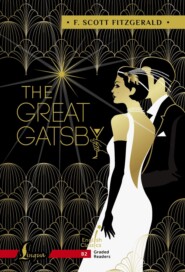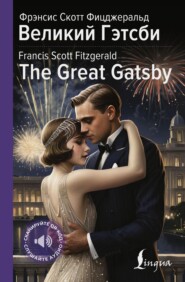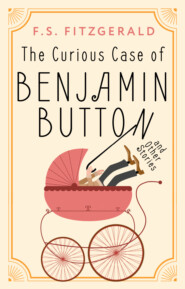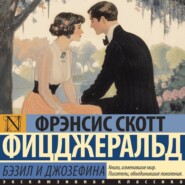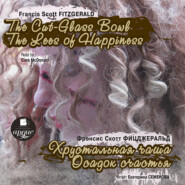По всем вопросам обращайтесь на: info@litportal.ru
(©) 2003-2025.
✖
The Curious Case of Benjamin Button and Selected Tales of the Jazz Age Сollection. Адаптированная книга для чтения на английском языке. Уровень B1
Настройки чтения
Размер шрифта
Высота строк
Поля
«Here!» cried Benjamin in despair. «Read this». And he gave his official letter to the colonel. The colonel read it, he was astonished.
«Where did you get this?» he demanded, putting the document into his own pocket.
«I got it from the Government, as you'll soon find out!»
«You come along with me», said the colonel with a strange look. «We'll go up to headquarters commander and talk this over. Come along».
The colonel turned and began moving in the direction of headquarters. There was nothing for Benjamin to do but follow him – he tried to keep as much dignity as possible and promised himself to take revenge. But this revenge did not materialize. Two days later, however, his son Roscoe materialized from Baltimore, irritated and angry at a quick trip, and escorted the general in tears, without uniform, back to his home.
Chapter 11
In 1920 Roscoe Button's first child was born. While the family celebrated the event, however, no one thought they needed to mention, that the little boy, about ten years old who played around the house with lead soldiers, was the new baby's own grandfather.
No one disliked the little boy whose fresh, cheerful face seemed a little bit sad, but to Roscoe Button his presence was unpleasant and made him suffer. His generation did not consider such a state of things[54 - state of things – положение дел] «rational». It seemed to him that his father, in refusing to look sixty, did not behave like a true man of business or a «red-blooded he-man»[55 - red-blooded he-man – настоящий мужчина] – these were Roscoe's usual words. Roscoe believed that a man of business should look young, but his father's desire to keep to it in such a curious and wrong manner was irrational. Roscoe was sure of it.
Five years later Roscoe's little boy grew old enough to play childish games with little Benjamin under the control of the same nurse. Roscoe took them both to kindergarten on the same day, and Benjamin found that playing with colored paper and making colored beautiful maps was the most fascinating game in the world. Once when he behaved badly and had to stand in the corner, he burst into tears – but for the most part these were happy hours in the cheerful room, when the sunlight was coming in the windows and he enjoyed feeling his teacher's kind hand on his head.
Roscoe's son went to school after a year, but Benjamin stayed on in the kindergarten. He was very happy. Sometimes when other children talked about what they would do when they grew up, a sad expression appeared on his little face as if he understood that those things would never happen to him.
The days passed on in a usual way. He went back a third year to the kindergarten, but he was too little now to understand what the bright colored papers were for. He cried because the other boys were bigger than he, and he was afraid of them. The teacher talked to him, but though he tried to understand he could not understand at all.
He was taken from the kindergarten. His nurse, Nana became the centre of his small world. On bright days they walked in the park; Nana pointed at a large gray monster and said «elephant», and Benjamin repeated it after her, and when he was going to bed that night he repeated it over and over again to her: «Elyphant, elyphant, elyphant». Sometimes Nana let him jump on the bed, and that was fun, because he enjoyed jumping.
He loved to take a big cane and go around the house, hitting chairs and tables with it and saying: «Fight, fight, fight». When there were people in the house the old ladies tried to speak childish language with him, which interested him, and the young ladies tried to kiss him, which he accepted with calm boredom. And when the long day was over at five o'clock Nana took him upstairs and gave him his evening foods with a spoon.
There were no old memories in his childish sleep; he didn't remember his brave days at college or the bright years when he broke the hearts of many girls. There were only the white, safe walls of his crib and Nana and a man who came to see him sometimes, and a great big orange ball that Nana pointed at and called «sun». When the sun went his eyes were sleepy – there were no dreams, no dreams to worry him.
The past – the wild fight when he led his soldiers up San Juan Hill; the first years of his marriage when he worked hard for young Hildegarde whom he loved; the days before that when he sat smoking with his grandfather in the dark old Button house – all these memories faded like dreams from his mind as if they had never been. He did not remember.
He did not remember clearly whether the milk was warm or cool at his last feeding or how the days passed – there was only his crib and Nana's familiar presence. And then he remembered nothing. When he was hungry he cried – that was all. Through the days and nights he breathed and there were soft sounds over him that he hardly heard. He felt only faint smells, and light and darkness.
Then it was all dark, and his white crib and the dim faces that moved above him, and the warm sweet smell of the milk faded away from his mind.
May Day
I
The war had been fought and won and the great city of the winners was celebrating the victory. All through the long spring days the returning soldiers marched up the highway to the loud sounds of the drums and happy sounds of the military orchestras. The great city had never seen such greatness and shine, because the returning young men were straight and brave, and the young women of the land were naive and pretty both of face and of figure.
There were many adventures that happened in the great city during this time, and several of them – or perhaps one – are presented here.
At nine o'clock on the morning of the first of May, 1919, a young man spoke to the room clerk at the Biltmore Hotel, asking if Mr. Philip Dean had checked in there, and if so, could he be connected with Mr. Dean's rooms. The young man was small, slender, and handsome; his eyes were shaped with unusually long eyelashes above and with the blue circles of ill health below, which gave his face an unnatural color as if he had a constant fever.
Mr. Dean was staying there. After a second the connection was made; a sleepy voice said «hello» from somewhere above.
«Mr. Dean? It's Gordon, Phil. It's Gordon Sterrett. I'm downstairs. I heard you were in New York and I had an idea you could be here».
The sleepy voice became enthusiastic. Well, how was Gordy, old boy! Well, he certainly was surprised and excited! Would Gordy come right up, for Heaven's sake[56 - for Heaven's sake – (идиом., разг.) ради бога]!
A few minutes later Philip Dean, dressed in blue silk pajamas, opened his door and the two young men greeted each other with a bit embarrassed enthusiasm. They were both about twenty-four, Yale graduates of the year before the war; but there the resemblance stopped. Dean was blond, healthy, and strong under his thin pajamas. Everything about him showed physical comfort. He smiled frequently, showing large and prominent teeth.
«Where did you get this?» he demanded, putting the document into his own pocket.
«I got it from the Government, as you'll soon find out!»
«You come along with me», said the colonel with a strange look. «We'll go up to headquarters commander and talk this over. Come along».
The colonel turned and began moving in the direction of headquarters. There was nothing for Benjamin to do but follow him – he tried to keep as much dignity as possible and promised himself to take revenge. But this revenge did not materialize. Two days later, however, his son Roscoe materialized from Baltimore, irritated and angry at a quick trip, and escorted the general in tears, without uniform, back to his home.
Chapter 11
In 1920 Roscoe Button's first child was born. While the family celebrated the event, however, no one thought they needed to mention, that the little boy, about ten years old who played around the house with lead soldiers, was the new baby's own grandfather.
No one disliked the little boy whose fresh, cheerful face seemed a little bit sad, but to Roscoe Button his presence was unpleasant and made him suffer. His generation did not consider such a state of things[54 - state of things – положение дел] «rational». It seemed to him that his father, in refusing to look sixty, did not behave like a true man of business or a «red-blooded he-man»[55 - red-blooded he-man – настоящий мужчина] – these were Roscoe's usual words. Roscoe believed that a man of business should look young, but his father's desire to keep to it in such a curious and wrong manner was irrational. Roscoe was sure of it.
Five years later Roscoe's little boy grew old enough to play childish games with little Benjamin under the control of the same nurse. Roscoe took them both to kindergarten on the same day, and Benjamin found that playing with colored paper and making colored beautiful maps was the most fascinating game in the world. Once when he behaved badly and had to stand in the corner, he burst into tears – but for the most part these were happy hours in the cheerful room, when the sunlight was coming in the windows and he enjoyed feeling his teacher's kind hand on his head.
Roscoe's son went to school after a year, but Benjamin stayed on in the kindergarten. He was very happy. Sometimes when other children talked about what they would do when they grew up, a sad expression appeared on his little face as if he understood that those things would never happen to him.
The days passed on in a usual way. He went back a third year to the kindergarten, but he was too little now to understand what the bright colored papers were for. He cried because the other boys were bigger than he, and he was afraid of them. The teacher talked to him, but though he tried to understand he could not understand at all.
He was taken from the kindergarten. His nurse, Nana became the centre of his small world. On bright days they walked in the park; Nana pointed at a large gray monster and said «elephant», and Benjamin repeated it after her, and when he was going to bed that night he repeated it over and over again to her: «Elyphant, elyphant, elyphant». Sometimes Nana let him jump on the bed, and that was fun, because he enjoyed jumping.
He loved to take a big cane and go around the house, hitting chairs and tables with it and saying: «Fight, fight, fight». When there were people in the house the old ladies tried to speak childish language with him, which interested him, and the young ladies tried to kiss him, which he accepted with calm boredom. And when the long day was over at five o'clock Nana took him upstairs and gave him his evening foods with a spoon.
There were no old memories in his childish sleep; he didn't remember his brave days at college or the bright years when he broke the hearts of many girls. There were only the white, safe walls of his crib and Nana and a man who came to see him sometimes, and a great big orange ball that Nana pointed at and called «sun». When the sun went his eyes were sleepy – there were no dreams, no dreams to worry him.
The past – the wild fight when he led his soldiers up San Juan Hill; the first years of his marriage when he worked hard for young Hildegarde whom he loved; the days before that when he sat smoking with his grandfather in the dark old Button house – all these memories faded like dreams from his mind as if they had never been. He did not remember.
He did not remember clearly whether the milk was warm or cool at his last feeding or how the days passed – there was only his crib and Nana's familiar presence. And then he remembered nothing. When he was hungry he cried – that was all. Through the days and nights he breathed and there were soft sounds over him that he hardly heard. He felt only faint smells, and light and darkness.
Then it was all dark, and his white crib and the dim faces that moved above him, and the warm sweet smell of the milk faded away from his mind.
May Day
I
The war had been fought and won and the great city of the winners was celebrating the victory. All through the long spring days the returning soldiers marched up the highway to the loud sounds of the drums and happy sounds of the military orchestras. The great city had never seen such greatness and shine, because the returning young men were straight and brave, and the young women of the land were naive and pretty both of face and of figure.
There were many adventures that happened in the great city during this time, and several of them – or perhaps one – are presented here.
At nine o'clock on the morning of the first of May, 1919, a young man spoke to the room clerk at the Biltmore Hotel, asking if Mr. Philip Dean had checked in there, and if so, could he be connected with Mr. Dean's rooms. The young man was small, slender, and handsome; his eyes were shaped with unusually long eyelashes above and with the blue circles of ill health below, which gave his face an unnatural color as if he had a constant fever.
Mr. Dean was staying there. After a second the connection was made; a sleepy voice said «hello» from somewhere above.
«Mr. Dean? It's Gordon, Phil. It's Gordon Sterrett. I'm downstairs. I heard you were in New York and I had an idea you could be here».
The sleepy voice became enthusiastic. Well, how was Gordy, old boy! Well, he certainly was surprised and excited! Would Gordy come right up, for Heaven's sake[56 - for Heaven's sake – (идиом., разг.) ради бога]!
A few minutes later Philip Dean, dressed in blue silk pajamas, opened his door and the two young men greeted each other with a bit embarrassed enthusiasm. They were both about twenty-four, Yale graduates of the year before the war; but there the resemblance stopped. Dean was blond, healthy, and strong under his thin pajamas. Everything about him showed physical comfort. He smiled frequently, showing large and prominent teeth.
Вы ознакомились с фрагментом книги.
Приобретайте полный текст книги у нашего партнера:
Приобретайте полный текст книги у нашего партнера:






